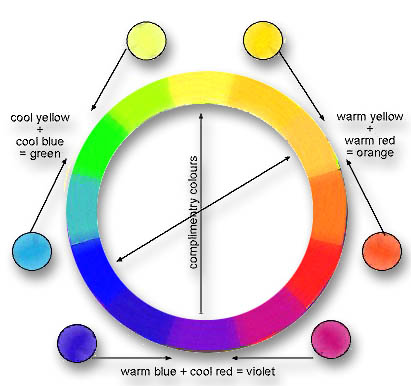|
Favorites
| |
My
hobbies, projects or
interests.
|
COLOR
THEORY

|
| The
12 part color wheel below is based on the three primary colors ( Red,
Yellow and Blue ) placed evenly around a circle.
Between the three primaries are
the secondary colors (Green, Orange and Violet) which are mixtures of the
two primaries they sit between.
The tertiary colors fall between
each primary and secondary. Between yellow and orange, for example, is
yellow orange, between blue and violet is blue violet and so on.
All these colors around the
outside of the color wheel are called saturated colors. They contain no
black, no white and none of their complimentary or opposite color.
NB. Some books
will refer to tertiary colors as a mixture of the three primaries and only
break the color wheel into six colors (primaries and secondary). I prefer
the theory based on Johannes Item's 12 part color wheel, as it offers a
much better understanding of the interaction of colors
Compound colors
are colors containing a mixture of the three primaries. All the browns,
khakis and earth colors are compound colors
|
|

|
In
order to mix pigments into clean saturated colors it is necessary to
include a warm and cool of each of the primaries in your palette. There is
no such thing as a pure primary pigment, so when mixing green for example,
choosing a cool blue such as phthalate and a cool yellow such as lemon
ensures there is no trace of red in the green. Using a warm yellow like
cadmium or a warm blue such as ultramarine would introduce a slight trace
of red into the green resulting in a compound color. |
| |
|

|
In
this illustration the compound mixtures between red and green are shown,
as are tints and shades of the color wheel. Tints are made by adding white
to a color, shades are made by adding black |
| Imagine
a color wheel filled in with all the compound mixtures between all the
complementary colors. If this color wheel is placed in the middle of a
cylinder with progressively darker shades of all those colors below and
progressively lighter tints above, the cylinder would contain every
possible color!
©
John Lovett
|
Interest 4 Periods
and styles
 |
 |
Art
Deco |
 |
ART
DECO, style popular in the 1920s and 1930s, used primarily in the
design of buildings, furniture, jewelry, and interior, style popular
in the 1920s and 1930s, used primarily in the design of buildings,
furniture, jewelry, and interior deco... |
|
 |
 |
Arts
and Craft movement |
 |
ARTS
AND CRAFTS MOVEMENT, art movement of the last half of the 19th century
that strove to revitalize handicrafts and applied arts during an, art
movement of the last half of the 19th century that strove to
revitalize handicrafts and applied arts during an era... |
 |
 |
|
bentwood |
 |
type of furniture, originally made by steam-heating and then bending
rods of wood to form panels. Initially a country, type of furniture,
originally made by steam-heating and then bending rods of wood to form
panels. Initially a country... |
 |
Biedermeier
style |
 |
BIEDERMEIER
STYLE, a furniture and interior design style popular in Germany and
Austria between 1815 and 1860. Characterized by a, a furniture and
interior design style popular in Germany and Austria between 1815 and
1860. Characterized by a cheerful... |
 |
 |
|
|
 |
chinoiserie |
 |
CHINOISERIE,
style in Western art characterized by forms and motifs derived from
Chinese art. Chinoiserie became fashionable in, style in Western art
characterized by forms and motifs derived from Chinese art. Chinoiserie
became fashionable in Euro... |
 |
 |
 |
|
 |
Directories
style |
 |
DIRECTORIES
STYLE, a style in furniture, interiors, and clothing in France during
the period of the Directory (1795-1799). The, a style in furniture,
interiors, and clothing in France during the period of the Directory
(1795-1799). The Directories... |
 |
 |
 |
|
 |
Elizabethan
style |
 |
ELIZABETHAN
STYLE, in English art, a period between the Gothic and Renaissance
styles. It reached its apogee in the late 1500s, toward, in English
art, a period between the Gothic and Renaissance styles. It reached
its apogee in the late 1500s, toward the... |
 |
 |
 |
|
 |
Empire
style |
 |
EMPIRE
STYLE, neoclassical style of architecture, interior design, and
women's dress during the period (1795?-1815) of the, neoclassical
style of architecture, interior design, and women's dress during the
period (1795?-1815) of the consulate... |
 |
 |
 |
|
 |
Georgian
style |
 |
GEORGIAN
STYLE, neoclassical style of architecture and interior design, popular
in Britain during the reigns of the first four, neoclassical style of
architecture and interior design, popular in Britain during the reigns
of the first four Georges...
Encarta.
msn. com
|
 |
 |
|
|